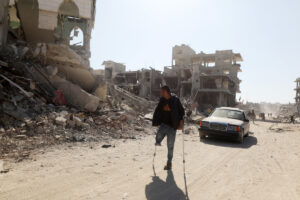Gazans dreamed of returning to Rafah. The reality is a nightmare

A Palestinian amputee returns to his destroyed neighborhood in Rafah, south Gaza, 21 January 2025
Ruwaida Kamal Amer reports in +972 on 4 February 2025:
Eight months after Israel invaded Gaza’s southernmost city of Rafah, forcibly displacing over 1 million Palestinians, the ceasefire has enabled some of the city’s former residents to return home. But unlike in Gaza’s northern sector, where the relatively swift and complete withdrawal of Israeli forces made it possible for tens of thousands of displaced residents to go back to their devastated neighborhoods, the army’s continued presence in Rafah along the border with Egypt and its ongoing attacks on returning civilians means that only a small number have attempted to make their way back.
According to the Health Ministry in Gaza, Israeli forces have killed 80 Palestinians in the Strip since Jan. 19, the date the ceasefire began. Sixty of those deaths occurred on that first day, when Israel delayed the implementation of the deal for several hours, and it is unclear how many were killed before or after it technically went into force. Out of the 80 casualties, half have been in Rafah alone.
Among them was 24-year-old Hassan Issa Abu Sharkh, from Rafah’s Al-Shaboura neighborhood. His cousin, Amani, said that Abu Sharkh had advised the family to wait a few days before going back “because the [Israeli] army always betrays us,” but decided to return on the third day of the ceasefire in order to check on their home and prepare it for the family’s return. “The house was very badly damaged,” Amani told +972. “Only the columns and the roof were left intact, but all the walls were destroyed.”
It was during that visit, Amani recounted, that Abu Sharkh was shot dead by an Israeli sniper in circumstances that remain unclear to the family. He was rushed to hospital in critical condition and succumbed to his wounds the next morning. “We are all in shock,” she said. “He was his parents’ eldest son, an ambitious young man. He worked very hard as a private English teacher to help his family.”
After Abu Sharkh’s killing, the Rafah Municipality warned other residents against returning to the area for their own safety. “Unfortunately, we don’t know which places are dangerous because of the army’s [continued] presence,” Amani said.Rafah’s mayor, Dr. Ahmed Al-Sufi, told +972 that Israeli forces stationed near the border were still firing at Palestinians attempting to return in recent days. “There are still Israeli military vehicles in some areas, and they are shooting at civilians, so we have urged people not to return until the situation stabilizes,” he said. He also warned that the “complete lack of infrastructure” further endangers those trying to come back.
